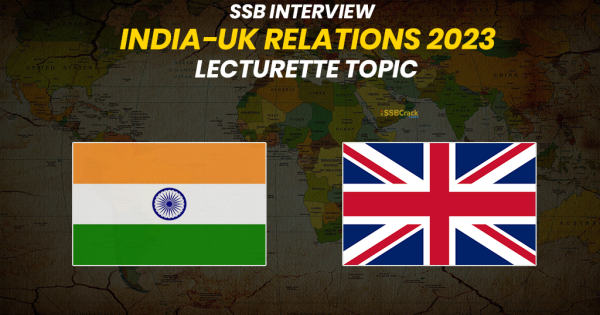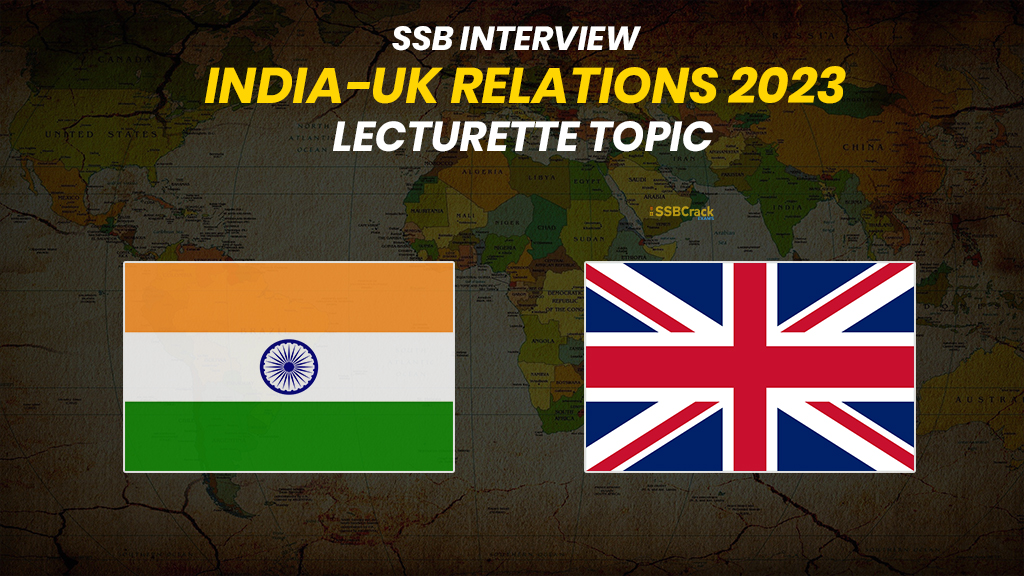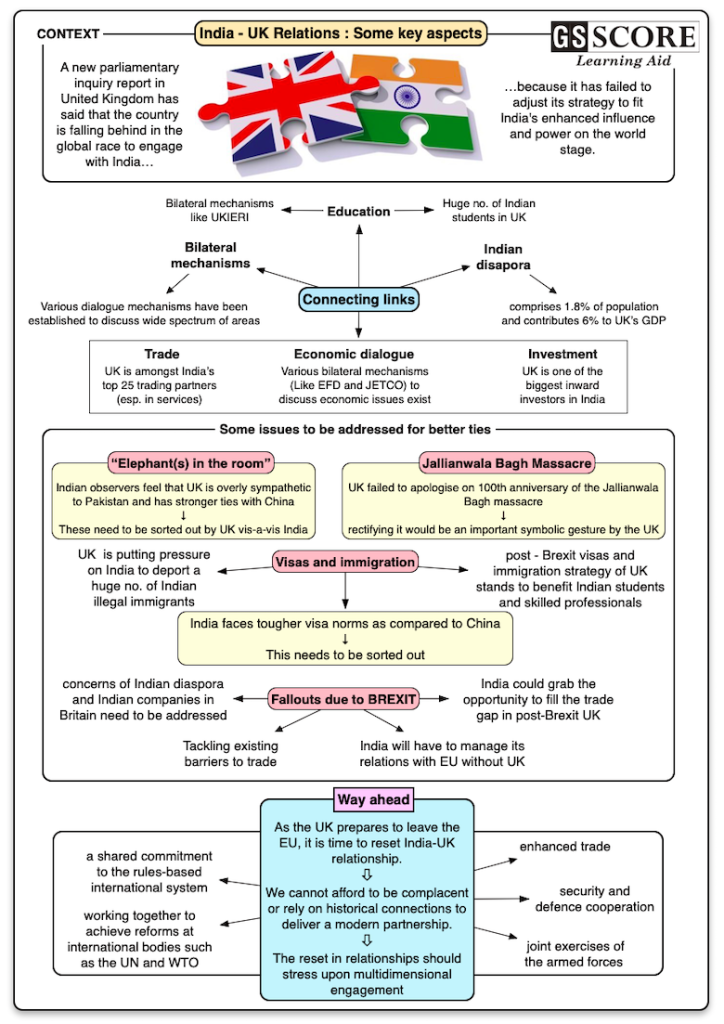India and the United Kingdom have a long and complex connection that is formed by historical and cultural links, as well as similar interests in numerous fields. The two countries have a long and complicated history that includes colonization, independence movements, and post-colonial alliances. India and the United Kingdom are now significant economic partners, with substantial trade and investment relations that benefit both countries. The United Kingdom is also a popular destination for Indian students, professionals, and tourists, and India has a sizable and thriving British ex-pat population. Furthermore, India and the United Kingdom have worked together on a variety of global concerns, including climate change, counter-terrorism, and regional security.
India – UK relations
- Since India’s independence in 1947, India and the United Kingdom have maintained a multidimensional connection.
- India was the UK’s second-largest commercial partner in the 1990s, but by 2021, it had dropped to the 15th position. The United Kingdom will be India’s 18th largest commercial partner by 2021.
- India and the United Kingdom have been discussing the potential of a ‘Free Trade Agreement’ (FTA) since January 2022. If the agreement is signed, it will promote India-UK commerce and benefit both countries.
- For a variety of reasons, a change of leadership in the United Kingdom may have no impact on India-UK relations. Most crucially, improved commercial links with India are critical for the UK’s ‘Global Britain’ objective. Furthermore, the British Indian population in the UK is 1.8%.
- The United Kingdom is a significant investor in India. It recently spent $89 million to boost the growth of India’s renewable energy sector.
- India and the United Kingdom have a modern alliance that is rooted in deep historical ties.
- In 2004, India’s multidimensional bilateral relationship with the United Kingdom was upgraded to a Strategic Partnership.
- A Joint Declaration titled “India-UK: Towards a New and Dynamic Partnership,” calls for yearly summits and regular meetings of Foreign Ministers.
- In 2021, India and the United Kingdom decided to form a new ‘Enhanced Commerce Partnership (ETP) to boost bilateral commerce. Furthermore, the ‘Roadmap 2030’ initiative was formed with the goal of doubling bilateral commerce by 2030. Both countries agreed to collaborate on commerce, defense, cyber security, and climate change mitigation.
- India and the United Kingdom have cooperative relations in civil nuclear energy, space, defense, counter-terrorism, economic linkages, research and technology, education, and culture.
- The United Kingdom (UK) supports India’s application for permanent membership in the United Nations Security Council (UNSC) and is a significant interlocutor for India in the European Union (EU), Group of Eight (G-8), G20, and global contexts.
Significance of the Indo-UK Partnership
- For the United Kingdom: India is a critical strategic partner for the United Kingdom in the Indo-Pacific, both in terms of market share and defense, as evidenced by the signing of the Defence and International Security Partnership between India and the United Kingdom in 2015.
- A successful conclusion of an FTA with India would bolster Britain’s ‘Global Britain’ objectives, as the country has pushed to extend its markets beyond Europe since Brexit.
- Britain has been attempting to exploit chances in the Indo-Pacific’s expanding economies in order to solidify its place in the world arena as a serious global actor.
- With solid bilateral relations with India, the British would be better equipped to fulfill their goal.
- For India, the United Kingdom is a regional power in the Indo-Pacific, with naval bases in Oman, Singapore, Bahrain, Kenya, and British Indian Ocean Territory.
- The UK has also committed £70 million in British International Investment money to assist renewable energy use in India, which will aid in the development of renewable energy infrastructure and solar power in the region.
- India has sought free market access for Indian fisheries, pharmaceuticals, and agricultural products, as well as duty exemptions for labor-intensive exports.
Major Problems in the India-UK Relations
- Colonial Prism: India’s post-colonial relationship with Britain has been fraught with inconsistencies. The persisting post-colonial resentments in India, along with the UK’s untenable claim to a special role in the Subcontinent, created unending friction. Partition and the Cold War made it more difficult for the two countries to build a long-term alliance. However, recent regional and worldwide upheavals have created a new foundation for mutually beneficial cooperation.
- Pakistan has also been a major impediment to India’s bilateral relations with the United Kingdom. India has always been concerned about Britain’s support for Pakistan. Unlike the United States and France, which are dedicated to an “India first” approach in South Asia, the United Kingdom is split between its newfound enthusiasm for India and the inertia of its past inclination towards Pakistan.
- Britain’s Domestic Politics: Britain’s domestic dynamics have also strained ties with India. In Delhi, it was widely assumed that the Labour Party was sympathetic to India whereas the Conservative Party was not. Although this turned out to be incorrect, animosity towards India existed in some form or another. The Labour Party had become increasingly antagonistic to India’s domestic affairs, notably Kashmir.
Strengthening India-UK Partnership
- A post-Brexit Britain must capitalize on its historic links; having exited Europe, the country requires all the allies it can find, and a rising India is naturally among the top political and economic priorities.
- Both India and the United Kingdom are serious about resolving legacy issues and engaging in meaningful conversations to promote cooperation on strategic and defence matters in the Indo-Pacific and beyond.
- Meanwhile, India has become supremely confident in dealing with the UK; with the Indian economy projected to surpass Britain’s in the next years, India is and will be no more defensive in engaging Britain.
- India should work harder to utilize British strengths for strategic advantage.
- The British Prime Minister’s imminent visit to India underscores the significance of India’s role in the dynamically shifting global order.
- One of the primary focal areas for the next visit should be progress on the India-UK FTA negotiations.
- Fintech, market regulation, sustainable and green finance, and cyber security are some of the emergent areas of collaboration that may develop as new frontiers of this engagement.
To crack the SSB Interview and join the Indian Army as an Officer, You can join our SSB interview live classes batch and we recommend you to Enroll SSB INTERVIEW ONLINE COURSE. Trusted by thousands of defence aspirants.
Also Read:
- India-Maldives Relations: SSB Interview Lecturette Topic 2023
- India-Bangladesh Relations: SSB Interview Lecturette Topic 2023
- India-Japan Relation: SSB Interview Lecturette Topic 2023
- Geopolitical Importance Of The Indian Ocean: SSB Interview Lecturette Topic 2023
- All About Paris Club: SSB Interview Lecturette Topic
- PM Narendra Modi Has Been Named The Most Popular Leader In The World
- Hindenburg Report On Adani – Here’s What You Need To Know
- India At WEF Davos Summit 2023: Here Are 10 Key Highlights
- Pakistan Economic Crisis 2023: SSB Interview Topic [Fully Explained]
- Joshimath Crisis: What Does “Land Subsidence” Mean, And Why Does It Happen?
- Top 10 Animal Conservation Projects In India [MUST WATCH]
- What Is Shanghai Cooperation Organisation (SCO) Summit 2022? [Fully Explained]
- 20 SSB Interview Questions On Russia Ukraine Crisis
- What Is The (India-Israel-UAE-USA) I2U2 Summit? [Fully Explained]
- What Is International North-South Transport Corridor (INSTC)?
- What Is Sri Lankan Crisis? [Fully Explained]
- What Is The BIMSTEC Grouping And How Is It Significant? [EXPLAINED]
- What Is The Places Of Worship (Special Provisions) Act, 1991? [Explained]
- What Is Bodo Accord | SSB Interview Notes [Fully Explained]
- What Is AFSPA: Armed Forces (Special Powers) Act?
- What Is G20 Or Group Of Twenty Countries?
- What Is AFSPA: Armed Forces (Special Powers) Act?
- What Is The Financial Action Task Force (FATF)? [Fully Explained]
- What Is Quadrilateral Security Dialogue (QUAD)?
- Difference Between NATO Vs Russia [Expained]
- What Is United Nations Security Council (UNSC) [Explained]
- Everything You Need To Know About SAARC: South Asian Association For Regional Cooperation
- All About Russia Ukraine War: SSB Interview Topic [Fully Explained]












